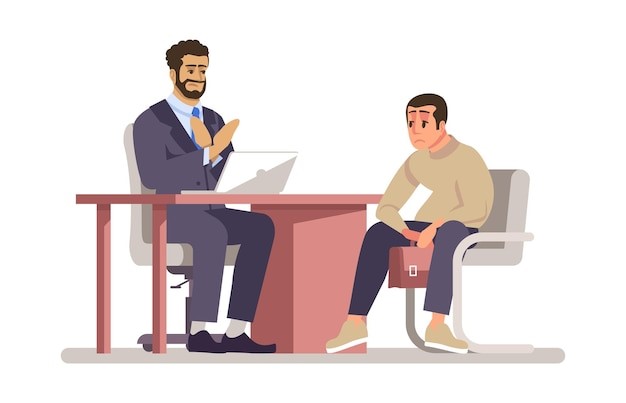How To Handle Rejection After a Job Interview
Many people struggle to land jobs after an interview ends. Rejection stings but each interview is a learning lesson on how to better at the next one. Keep reading to learn how to handle rejection from a job interview.
Be honest with yourself
The first thing you need to do when you get a job rejection is to be honest with yourself. Admitting that the job wasn’t a fit or that you just missed out is the first step towards regaining your confidence and moving on with your life. It’s okay to feel disappointed and upset about getting rejected.
You don’t want to let the rejection get to you though. Instead, acknowledge that you tried your best, accept that you may not have been the right fit for the job, and move on. Even with the most professional and tactful approach, some employers aren’t going to want to hire you. That’s okay. Now, that you’re in the right mindset, let’s move onto the next stage of the job search process.
Be proactive
The moment you get a job rejection notice, you need to start taking steps towards improving your career. While you may not have a job offer in hand, there are several things you can do to get yourself noticed. Get your resume edited and re-written: You may have done a great job on your resume when you were applying for the job, but it’s possible that it wasn’t good enough for the hiring manager.
When you’re applying online, your resume is the first thing the employer sees. If it isn’t great, it can easily get tossed aside. Resume rewriting can turn a poor resume into a great one. Rephrase your resume: Have you ever read a resume and thought to yourself, “I could do that better?” Rephrasing your resume doesn’t mean rewriting it.
It means taking each bullet point and rewriting it to be a little bit more concise and improve its readability and impact. Make a cover letter: If a hiring manager has requested a cover letter, make sure you write one. You may think that the application process is all about the resume and the interview questions, but more interviews are gained if you use a cover letter.
Make sure your cover letter gets the hiring manager’s attention and shows them why you’re worth interviewing for the job. If you follow these steps, you’ll find yourself getting interviews and getting closer to a new job.
Don’t take it personally
You may get turned down for jobs more than a few times before you land a new position. The rejection may sting, but don’t take it personally. It’s not about you, it’s about the hiring manager’s decision. Don’t get wrapped up in why they rejected you. It may be that they have a number of qualified candidates to choose from.
Don’t let one rejection keep you down. There are still plenty of job opportunities to be found, so don’t let the rejection get the best of you. Stay positive and keep searching. Make sure you’re taking notes during your job interviews as well. If you were able to take note of how the interviewer responded to certain questions, how they asked them, or what they kept referencing, it can help you better prepare for your next interview.
This way, you’ll be more confident in your abilities and you’ll be able to impress the interviewer with your qualifications the next time.
Have a backup plan
Sometimes, the best way to handle job rejection is to have a backup plan ready. For example, if you keep getting rejected for job interviews, consider interviewing for a different position. Even if you don’t get to that position in a specific company, you’ll have gained experience and may have learned a few things along the way.
This way, you won’t be completely lost if you get rejected the next time around. Another thing to keep in mind is to keep networking. You never know who you may run into while networking. A former manager, an industry contact, or even a co-worker you once worked with at a different company may have connections to help you land a job.
Networking is a great way to stay connected with people in your industry and make connections that can lead to new opportunities as well.
Conclusion
Job rejection is horrible. It can be difficult to accept but you have to move on and find another job. When you get turned down for the job don’t allow it to stop you from pursuing new opportunities or finding a new career path. With a little work and perseverance, rejection can become a stepping stone to success.



